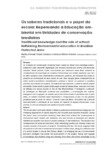Os saberes tradicionais e o papel da escola: repensando a educação ambiental em Unidades de conservação brasileiras

View/
Use this link to cite
http://hdl.handle.net/2183/22317
Except where otherwise noted, this item's license is described as Atribución-CompartirIgual 3.0 España
Collections
Metadata
Show full item recordTitle
Os saberes tradicionais e o papel da escola: repensando a educação ambiental em Unidades de conservação brasileirasAlternative Title(s)
Traditional knowledge nad the role of school: rethinking environmental education in Brazilian Protected AreaDate
2015Citation
Ambientalmente Sustentable, 2015, 20: 1827-1840. ISSN: 1887-2417
Abstract
[Resumo] As Unidades de Conservação Ambiental foram criadas no Brasil como estratégia político-ambiental e pela crescente degradação dos recursos naturais que ocorreu pós-revolução industrial. Nesse período muitas comunidades que habitavam essas áreas sofreram as consequências da importação de modelos internacionais com caráter neoliberal, que viam os seres humanos como destruidores e precisavam, portanto, ser excluídos dos locais ou privados da continuidade de seus modos de vida. Essa situação gerou consequências de ordem social e econômica, intensificando a pobreza e criando um profundo e complexo processo de exclusão dos sujeitos. Considerando esta realidade, o presente estudo propõe discussões iniciais sobre o papel da Educação ambiental nessas áreas, tomando como eixo de reflexão uma escola situada na Ilha do Mel (Paraná-Brasil). É emergente a utilização de estratégias de Educação ambiental que possibilitem a emancipação dos sujeitos, dialogando com a bagagem de saberes que os educandos trazem e permitindo que, a partir deles, os saberes escolares sejam repensados e reorganizados, já que um dos grandes problemas que os povos do campo - como é o caso dos ilhéus - encontram são a falta de reconhecimento e valorização de sua cultura, em especial no espaço educacional, o que acarreta na falta de percepção dos sujeitos enquanto coletivo. [Abstract] The Conservation Units were created in Brazil as political and environmental strategy and theincreasing degradation of natural resources that occurred post-industrial revolution. During this period many communities inhabiting these areas have suffered the consequences of international import models with neoliberal, who saw humans as destroyers and needed therefore be excluded from local or private continuity of their livelihoods. This situation had consequences for social and economic order, intensifying poverty and creating a deep and complex process of exclusion of subjects. Considering this fact, this study suggests initial discussions on the role of environmental education in these areas, taking as a reflection axis of a school located in Ilha do Mel (Parana, Brazil). It is emerging the use of environmental education strategies that enable the emancipation of the subject, talking with luggage of knowledge that students bring and allowing, from them, the school knowledge to be rethought and reorganized, as a major problem that field people - as is the case of the islanders - find are lack of recognition and appreciation of their culture, especially in the educational space, which results in lack of awareness of the subject as a collective.
Keywords
Educação ambiental
Unidades de conservação
Escola pública
Emancipação
Saberes tradicionais
Environmental education
Protected areas
Public school
Emancipation
Traditional Knowledge
Unidades de conservação
Escola pública
Emancipação
Saberes tradicionais
Environmental education
Protected areas
Public school
Emancipation
Traditional Knowledge
Rights
Atribución-CompartirIgual 3.0 España
ISSN
1887-2417






